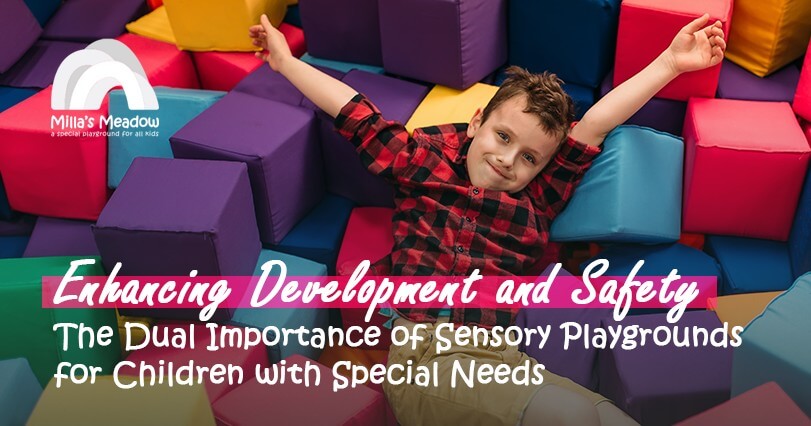Playgrounds are more than just spaces for children to expend energy; they are crucial environments for growth, learning, and social interaction. For children with special needs, these spaces play an even more significant role. They offer opportunities for inclusive play, sensory exploration, and the development of motor skills, communication, and social interaction in a nurturing environment. This blog explores the importance of designing playgrounds that cater to children with special needs, ensuring every child can enjoy the benefits of play.
Why Special Needs Playgrounds Matter
- Inclusive Play Opportunities: Inclusive playgrounds are designed to be accessible to children of all abilities. These spaces encourage children with and without disabilities to play together, promoting understanding and empathy.
- Sensory Stimulation: Many children with special needs, such as those on the autism spectrum, benefit from specific sensory experiences. Playgrounds equipped with sensory play equipment can stimulate sight, sound, touch, and movement, contributing to sensory development.
- Physical and Emotional Development: Playgrounds allow children to develop physically, improving coordination, balance, and strength. Emotionally, they provide a setting for children to experience joy, accomplishment, and the freedom to explore at their own pace.
- Social Skills Enhancement: Through play, children learn to communicate, share, and collaborate with peers, essential skills for personal development and future social interactions.
Design Principles for Playgrounds Catering to Children with Special Needs
- Accessibility: Ensure playgrounds are wheelchair accessible, with smooth surfaces and ramps where needed.
- Variety of Equipment: Offer a range of play equipment that caters to different needs, including tactile panels, low-height activities, and quiet zones for children who might feel overwhelmed.
- Safety Features: Incorporate safety measures such as soft landing surfaces, secure fencing, and equipment designed to minimize accidents.
- Shaded Areas: Provide shaded or indoor areas to protect children from the sun and elements, making the playground enjoyable year-round.
- Quiet Zones: Designate areas where children can retreat if they feel overstimulated or need a break from play.
The Impact of Inclusive Playgrounds
Inclusive playgrounds not only benefit children with special needs but also serve as a valuable resource for the community, promoting diversity and acceptance. They offer a shared space where children can learn about differences and similarities, fostering a sense of belonging and inclusivity.
Playgrounds for children with special needs are not just a luxury; they are a necessity. They provide a foundation for learning, growth, and enjoyment for all children, regardless of their abilities. By investing in these inclusive spaces, communities can ensure that every child has the opportunity to play, explore, and develop in a supportive environment.

The Importance of Playgrounds for Children with Special Needs
Let’s advocate for more inclusive playgrounds in our communities. Share this post to raise awareness and support the development of playgrounds where every child can thrive together. #InclusivePlay #SpecialNeedsPlaygrounds #CommunitySupport
FAQ
| Question | Answer |
| What makes a playground inclusive? | Inclusive playgrounds are specially designed play areas that accommodate children of all abilities, everyone, regardless of physical, sensory, or cognitive disabilities, can play together in a safe, welcoming environment. |
| Why are sensory-friendly play equipment important in playgrounds for children with special needs? | Sensory-friendly play equipment is crucial because it helps children with special needs engage with their environment in a way that suits their sensory processing needs, promoting cognitive development, motor skills, and social interactions in a comfortable setting. |
| How can communities support the development of inclusive playgrounds? | Communities can support the development of inclusive playgrounds through fundraising, advocacy, volunteering, and partnering with organizations dedicated to creating accessible play spaces. Public awareness and community engagement are vital in driving the initiative forward. |
Tags/Keywords: Inclusive playgrounds, Special needs accessibility, Sensory-friendly play equipment, Physical development for children with disabilities, Social inclusion through play, Community support for inclusive play spaces


